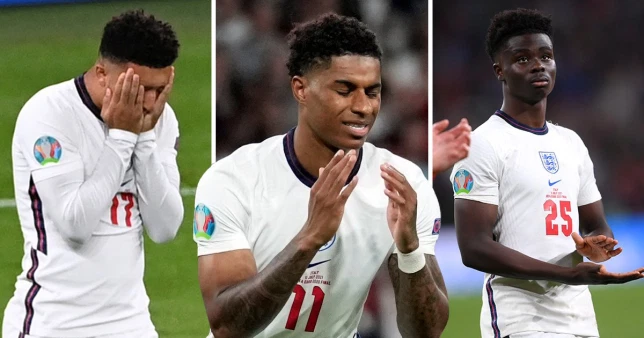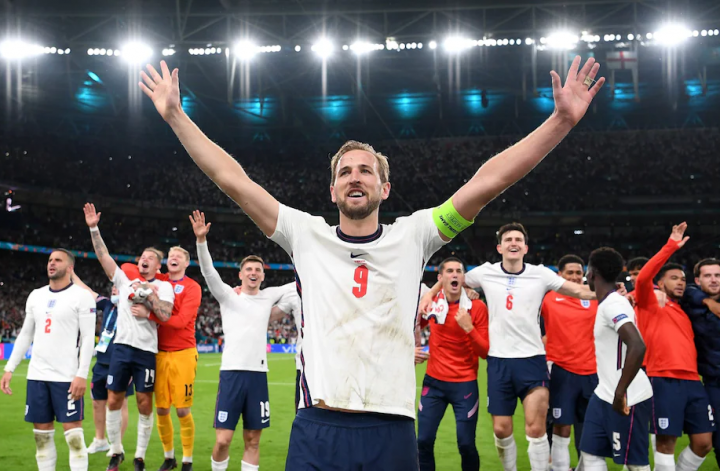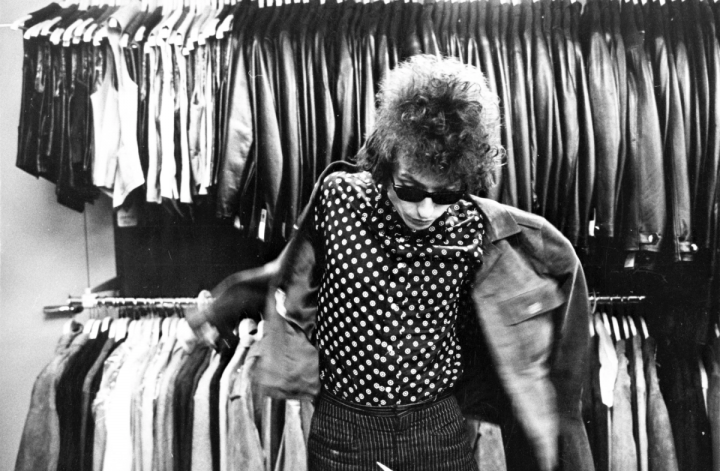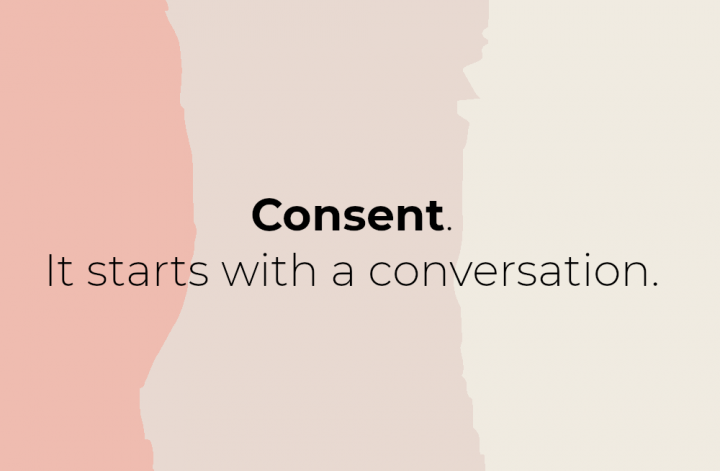I bloody love football. Every major tournament sends me mad. I cry, clap, scream, hug, kiss, scream some more. I bloody love football. But football culture is a mess; ingrained in toxic masculinity and upheld by homophobic, racist and sexist sentiment.
I’m so ashamed by the scenes from yesterday’s match against Italy – both the run up to and the fallout – that I am genuinely pleased England didn’t win.
While the team and the manager undoubtedly deserved it, the fans absolutely didn’t.
Football culture and toxic masculinity go hand in hand
Getting swept up in the game is part of what makes football great, right? For me, it’s my eyes brimming with hopeful tears every time I see the lads belting out the national anthem. It’s feeling confidence in an England goalkeeper for the first time in my life. It’s seeing our defensive lines looking bloody cracking. It’s Raheem Sterling and his little legs fleeing about the pitch – it’s pretty easy to get swept up in the game.
But once the game is over, I take a breath and everything goes back to normal. Last night it was a cup of peppermint tea and bed, previously it has been a couple more pints with my pals and home.
- I’ve never physically attacked anyone
- I’ve never verbally attacked anyone
- I’ve never taken to Instagram to leave monkey emojis in comments or DMs
- I’ve never posted racist bingo-type games that call for lynchings
- I’ve never smashed up my hometown or city
- I’ve never put an actual firework in someone’s arse and set it off
That’s humiliating behaviour, right? It’s also very real behaviour and it’s ingrained in toxic masculinity, rife and blatantly visible throughout football culture.
The animosity that our so-called fans have for the England team is deplorable. The actions that ensue when England win or lose have very real consequences for people that go beyond football, because toxic masculinity and football culture are so inextricably linked.
What is toxic masculinity?
Toxic masculinity describes the cultural norms of masculine behaviour that are harmful to men and to the general community.
These norms generally encompass traditional masculine ideals and behaviours, such as:
- Male dominance
- Emotional repression
- Self-reliance
- Aggression
- Superiority (usually over women, ‘weaker’ men and marginalised groups)
- Using or threatening violence
- Controlling others
- Trying to appear tough
- Feeling entitled to sex
- Treating sex as a competition
Toxic masculinity is very often seen in the open disdain for anything that is deemed feminine.
Using ‘girly’ as an insult.
The insistence that ‘boys don’t cry’.
Men are exposed to this from a young age, which can be seen in childhood socialisation and the normalisation of violent and aggressive behaviours, excused as ‘boys will be boys’.
It’s played out in society too, with boys and men being told to toughen up and repress their emotions. Emotional expression is a feminine trait, after all.
Adhering to these so-called traditional masucline ideals is toxic and they are linked to increased incidences of depression and suicide in men, as well as violence against women, including sexual assault and domestic violence.
This is what we mean by toxic masculinity. The type that conditions boys from a young age to believe there’s only one way to be a man, and that is a dominant, aggressive man devoid of any emotion (other than aggression), and forcing men to live within these constraints harms us all.
What does toxic masculinity have to do with football culture?
Putting a firework up someone’s bum and setting it off is not normal behaviour. Beating people up because your team lost in an historic match not seen by the men’s team in 55 years is not normal behaviour. Taking to the internet to bully a 19-year-old boy for missing a penalty is not normal behaviour. Calling a black person the N word because your team lost a game is not normal behaviour.
It’s violent, aggressive and rooted in toxic masculinity, which in itself is rooted in homophobia, racism and sexism, and this is the behaviour we see time and time again across England’s football culture.
This is not getting swept up in the game; this is insidious violence and a side to football that needs more attention if it is to get better.

What can we do to stamp out toxic masculinity in football culture?
Despite the scenes we’ve seen played out since yesterday, we can learn a lot from the current England squad. Together, they’re actively stepping back and taking a stance against toxic masculinity in football culture, and you can see it in everything they do.
Watching them frolic in a swimming pool with inflatables, doing Pilates, feeding children during a pandemic when the government all too readily ignored them (Marcus Rashford is a hero), donations to the NHS, consistently taking a knee before every game, despite the boos that ensue.
Yet none of this works for the fans. The gimmicks, the petitions, the social media blackouts… the taking a knee.
The FA said it was “appalled” by the online racism seen last night, with Boris Johnson echoing these sentiments.
However, a study by Lancaster University documented incidents of domestic violence when England were playing in 2002, 2006 and 2012. They found that there was a 38% rise of reported cases when England lost, and a 26% increase of reports when England won or drew.
So it’s not just online racism that we need to tackle to end toxic masculinity in football culture, it’s domestic violence and violence in general. It’s rioting in the streets, it’s gathering in thousands during a pandemic when things like women’s marches, Black Lives Matter and Pride have been openly condemned and/or cancelled.
As a society, we empower the football culture we’ve seen in the last few days because we do nothing to stop it individually or locally, and as much as our government have an enormous role to play in ending toxic masculinity in football culture, as well as the FA, UEFA and FIFA, we need to do our bit too.
Calling out ‘online hate’ for the blatant racism that it is, for a start, but even just acknowledging toxic masculinity on an individual level too – we’re all guilty of it at some point in our lives, and it’s a behaviour best unlearned.
But until all of this happens, despite having one of the greatest teams I’ve seen in my lifetime, and feeling more pride in our squad than I’ve ever felt before, I don’t want football to come home. Not if it means upholding a toxic football culture that holds young men in open contempt for losing one game in an otherwise cracking tournament.




